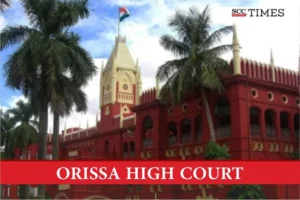Orissa High Court: In a civil writ petition challenging the requirement to pay social welfare surcharge (‘SWS’) on customs duty for import of petroleum coke which is exempted under scrip issued under the Merchandise Exports from India Scheme (MEIS), the Division Bench of Arindam Sinha and MS Sahoo, JJ. allowed the petition holding that SWS which is leviable on customs duty will be zero where a trader is exempted from paying customs duty under the MEIS. The Court directed that the petitioner was entitled to and gets declaration that it is not required to pay SWS calculated on customs duty, exempted under scrip held by it.
The petitioner imports petroleum coke, which is required in the manufacture of cement. Not being an exporter, it purchased duty credit scrip issued under the MEIS. In importing the goods, it is thereby exempted from the whole of the customs duty leviable thereon. The said scrip was issued in exercise of powers conferred under Section 25(1) of Customs Act, 1962. To import said goods, the petitioner used the scrip, however, he faced difficulties due to additional levy of SWS under Section 110 of the Finance Act, 2018.
The Court noted that the petitioner was not claiming exemption from SWS, but based his challenge on the contention that where the charge is on amount of customs duty paid and such duty is exempt, the charge being a percentage of duty paid, must be zero. The Court noted that the petitioner submitted that when no duty was paid so there cannot be a percentage of it, to result in any sum payable as SWS. The Court perused Section 110 of Finance Act, wherein, sub-sections (1) and (3) provide as follows:
(1) There shall be levied and collected, in accordance with the provisions of this Chapter, for the purposes of the Union, a duty of Customs, to be called a Social Welfare Surcharge, on the goods specified in the First Schedule to the Customs Tariff Act, 1975 (hereinafter referred to as the Customs Tariff Act), being the goods imported into India, to fulfil the commitment of the Government to provide and finance education, health and social security.
(3) The Social Welfare Surcharge levied under sub-section (1), shall be calculated at the rate of ten per cent. on the aggregate of duties, taxes and cesses which are levied and collected by the Central Government in the Ministry of Finance (Department of Revenue) under section 12 of the Customs Act, 1962 and any sum chargeable on the goods specified in sub-section (1) under any other law for the time being in force, as an addition to, and in the same manner as, a duty of customs, but not including— (a) the safeguard duty referred to in sections 8B and 8C of the Customs Tariff Act; (b) the countervailing duty referred to in section 9 of the Customs Tariff Act; (c) the anti-dumping duty referred to in section 9A of the Customs Tariff Act; (d) the Social Welfare Surcharge on imported goods levied under sub-section (1).
The Court disagreed with the view taken by the Division Bench of the Madras High Court in Gemini Edibles & Fats India (P) Ltd. v. Union of India, 2024 SCC OnLine Mad 4581 wherein it was viewed that MEIS/SEIS scrips is one of the modes of discharging the duty obligation under the Customs Act. The Court held that upon a person obtaining exemption, he cannot be said to be discharging liability to pay duty. The Court clarified that charging provision by sub-section (3) under Section 110 is a percentage of customs duty paid, as collected by the Central Government. The Court added that debits in the scrip are for the purpose of measuring of quantum of exemption utilized under it.
[Dalmia Cement (Bharat) Limited v. Union of India, 2024 SCC OnLine Ori 2664, decided on: 20-11-2024]

